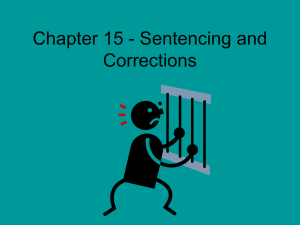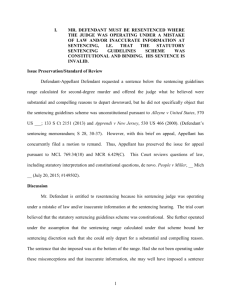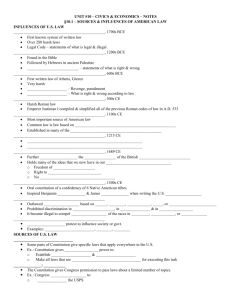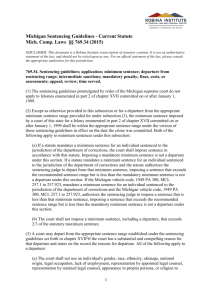Sample Brief 3 - Michigan State Appellate Defender Office
advertisement
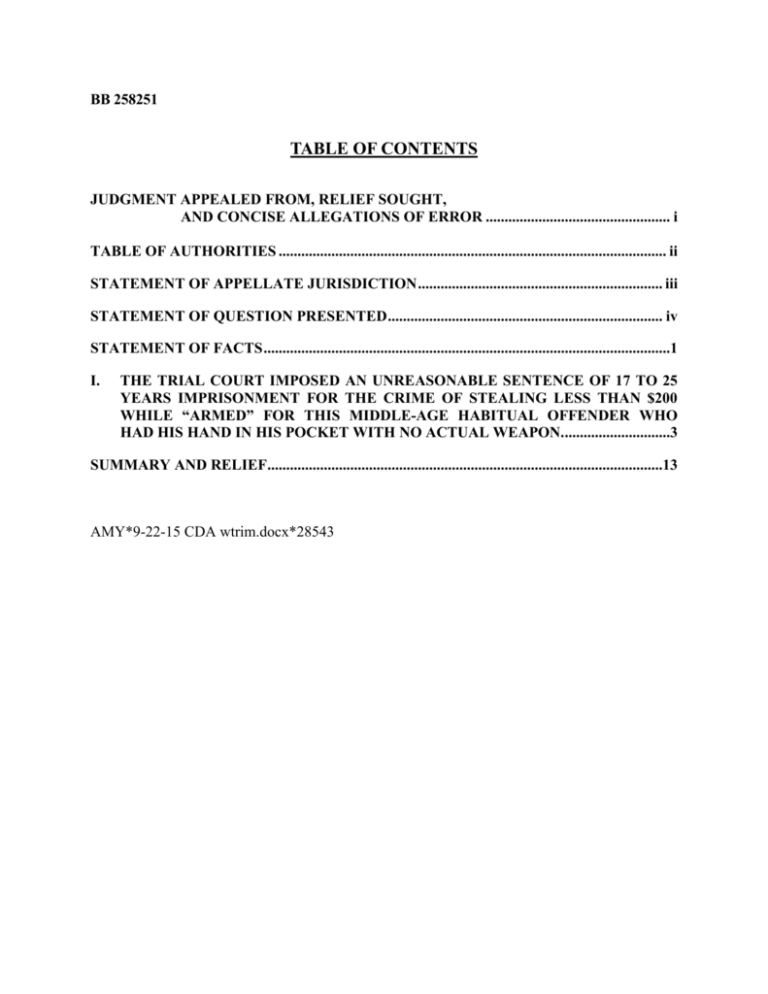
BB 258251 TABLE OF CONTENTS JUDGMENT APPEALED FROM, RELIEF SOUGHT, AND CONCISE ALLEGATIONS OF ERROR ................................................. i TABLE OF AUTHORITIES ....................................................................................................... ii STATEMENT OF APPELLATE JURISDICTION ................................................................. iii STATEMENT OF QUESTION PRESENTED ......................................................................... iv STATEMENT OF FACTS ............................................................................................................1 I. THE TRIAL COURT IMPOSED AN UNREASONABLE SENTENCE OF 17 TO 25 YEARS IMPRISONMENT FOR THE CRIME OF STEALING LESS THAN $200 WHILE “ARMED” FOR THIS MIDDLE-AGE HABITUAL OFFENDER WHO HAD HIS HAND IN HIS POCKET WITH NO ACTUAL WEAPON. ............................3 SUMMARY AND RELIEF.........................................................................................................13 AMY*9-22-15 CDA wtrim.docx*28543 JUDGMENT APPEALED FROM, RELIEF SOUGHT, AND CONCISE ALLEGATIONS OF ERROR Defendant appeals from the March 25, 2015 Judgment of Sentence in this matter (Judgment of Sentence and calendar or docket entries, Appendix A). This Court should grant leave to appeal and order resentencing because the 17-year minimum term for this middle age habitual offender who committed an armed robbery with a simulated gun, no injuries to the victim and modest financial loss reflects a disproportionately severe sentence that is unreasonable under the now advisory sentencing guidelines. See People v Lockridge,, ___ Mich ___ (Docket No. 149073, 7/29/15). i TABLE OF AUTHORITIES CASES People v Babcock, 469 Mich 247; 666 N.W.2d 231 (2003) ........................................................... 4 People v Broden, 428 Mich 343; 408 N.W.2d 789 (1987) ............................................................. 3 People v Coles, 417 Mich 523; 339 N.W. 2d 440 (1983) ......................................................... 4, 10 People v Curry (On Remand), 142 Mich App 724; 371 N.W.2d 854 (1985) ............................. 11 People v Hansford, 454 Mich 320; 562 N.W.2d 460 (1997)........................................................ 11 People v Milbourn, 435 Mich 630; 461 N.W. 2d1 (1990).......................................................... 4, 5 People v Smith, 482 Mich 292; 754 N.W. 2d 284 (2008) ............................................................... 3 Rita v United States, 551 US 338; 127 S.Ct 2456 (2007) ............................................................... 5 See People v Lockridge,, ___ Mich ___ (Docket No. 149073, 7/29/15) ........................................ 3 United States v Booker, 543 US 220; 125 S. Ct 738 (2005) ....................................................... 4, 5 United States v Gall, 552 US 38; 128 S.Ct 586; 169 L.Ed.2d 445 (2007) ..................................... 5 United States v Payton, 754 F3d 375 (CA 6, 2014)...................................................................... 11 CONSTITUTIONS, STATUTES, COURT RULES MCL 750.529 .................................................................................................................................. 1 MCL 769.34 .................................................................................................................................... 5 MCL 769.34(10) ......................................................................................................................... 5, 6 ii STATEMENT OF APPELLATE JURISDICTION Defendant-Appellant moves for leave to appeal from his November 13, 2014 guilty plea and March 25, 2015 sentencing in the Ingham County Circuit Court. 7.203(A)(1)(b). MCR 7.203(B)(1); MCR The judgment of sentence was filed on March 25, 2015. Mr. Defendant made a timely request for appellate counsel on March 30, 2015. The circuit court appointed appellate counsel on June 10, 2015. This delayed application is filed within six months of the sentencing date. 7.205(G)(3). iii MCR STATEMENT OF QUESTION PRESENTED I. DID THE TRIAL COURT IMPOSE AN UNREASONABLE SENTENCE OF 17 TO 25 YEARS IMPRISONMENT FOR THE CRIME OF STEALING LESS THAN $200 WHILE “ARMED” FOR THIS MIDDLE-AGE HABITUAL OFFENDER WHO HAD HIS HAND IN HIS POCKET WITH NO ACTUAL WEAPON? Trial Court answers, "No". Defendant-Appellant answers, "Yes". iv STATEMENT OF FACTS Defendant-Appellant pled guilty to armed robbery, MCL 750.529, on November 13, 2014, in the Ingham County Circuit Court. The Honorable Rosemarie Aquilina sentenced Mr. Defendant to a term of 17 to 30 years imprisonment on March 25, 2015. Judgment of Sentence, Appendix A. Mr. Defendant pled guilty as charge, although the prosecutor agreed to reduce the habitual offender enhancement from fourth to third offense. (11/13/14 T 4) The parties were aware that with enhancement as a fourth habitual offender, Mr. Defendant would have faced a mandatory minimum term of 25 years imprisonment. Id. In support of the guilty plea, Mr. Defendant admitted robbing a Speedway station attendant while simulating a gun with his hand in his pocket. (11/13/14 T 18). Mr. Defendant believed he received $80, but the station manager requested $177 in restitution. (11/13/14 T 19; PSI1 2) According to the store clerk during his preliminary examination testimony, Mr. Defendant entered the store between 3 and 4 a.m. on January 16, 2014. (7/17/14 T 5, 10) He did not respond to the clerk’s hello, and walked up behind the counter. (7/17/14 T 6, 11) He said he wanted the money and raised his hand, as if simulating a weapon, inside his pocket. (7/17/14 T 6, 7) He said “Give me the money, bitch” and “Don’t be a hero.” (7/17/14 T 15) He implied a gun with his hand in the pocket, but did not say he had a gun. (7/17/14 T 17). The clerk opened the register and gave him all of the money. (7/17/14 T 7) The clerk never saw a weapon. (7/17/14 T 7) The man asked for money in a second register, but the clerk explained the register was locked and the clerk could not open it. (7/17/14 T 8) The man told the clerk to lie on the 1 PSI refers to presentence investigation report. 1 ground and then left. (7/17/14 T 8) The clerk thought he gave the man approximately $180, although the man dropped $5 on the floor. (7/17/14 T 8, 13) The entire incident lasted one to two minutes. (7/17/14 T 13-14) 2 I. THE TRIAL COURT IMPOSED AN UNREASONABLE SENTENCE OF 17 TO 25 YEARS IMPRISONMENT FOR THE CRIME OF STEALING LESS THAN $200 WHILE “ARMED” FOR THIS MIDDLE-AGE HABITUAL OFFENDER WHO HAD HIS HAND IN HIS POCKET WITH NO ACTUAL WEAPON. The Court should grant leave to appeal to review this especially long sentence for the robbery of store clerk without injury, without a weapon and with only moderate financial loss (i.e., less than $200). A defendant need not object to the length of his sentence before raising the claim on appeal. See People v Smith, 482 Mich 292, 300 (2008); People v Cain, 238 Mich App 95, 129 (1999). Review for Reasonableness and Proportionality In People v Lockridge, ___ Mich ___ (Docket 149073, 7/29/15), the Michigan Supreme Court spoke of the trial court’s obligation to “justify” the sentence in order to facilitate appellate review. Slip op at 29. The Court set forth a “reasonableness” standard with reference to sentences falling outside the recommended range. Id. Although the Court was speaking of sentences outside the range, there was no qualifier to the Court’s subsequent statement that “[r]esentencing will be required when a sentence is determined to be unreasonable.” Id. Review for reasonableness - even of a sentence falling within the sentencing guidelines range - appears consistent with the standard of review under the judicial sentencing guidelines. With the judicial sentencing guidelines, a sentence falling within the recommended range of accurately scored sentencing guidelines was considered presumptively proportionate, People v Broden, 428 Mich 343, 354 (1987), although “even a sentence within the sentencing guidelines 3 could be an abuse of discretion in unusual circumstances.” People v Milbourn, 435 Mich 630, 661 (1990). Reasonableness is the standard for review for federal sentences, whether the sentence falls within the sentencing guidelines range or outside the range. United States v Booker, 543 US 220, 261-263 (2005). The reasonableness standard is new, at least to Michigan sentencing law. In the past, appellate review of a sentence focused on the abuse of discretion standard that initially looked to whether the sentence “shocks the conscience” of the court. People v Coles, 417 Mich 523, 550 (1983). This standard gave away to an abuse of discretion standard that focused on the “proportionality” of the sentence. Milbourn. With the advent of the legislative (originally mandatory) sentencing guidelines, appellate review for an abuse of discretion focused on whether the sentence, if it fell outside the recommended range, reflected a sentence within a “principled range of outcomes.” People v Babcock, 469 Mich 247, 269 (2003). It would appear the proportionality standard best reflects the abuse of discretion standard that should apply under the new “reasonableness” test for sentences under the now-advisory sentencing guidelines. The proportionality standard was the most recent articulation of the abuse of discretion standard using advisory sentencing guidelines in Michigan. Milbourn. Moreover, the proportionality standard was designed to curb unjustified disparity in sentencing. Milbourn at 636. In Lockridge, the Supreme Court adopted a remedy of advisory sentencing guidelines because this remedy “’continue[s] to move sentencing in [the legislature’s] preferred direction, helping to avoid excessive sentencing disparities while maintaining flexibility sufficient to individualize sentences where necessary.’” Lockridge at 28-29, quoting Booker at 264-265. 4 The Court of Appeals May Review a Within Guidelines Sentence A sentence falling within the federal sentencing guidelines range may be presumed reasonable by the reviewing court, but that presumption is not binding. Rita v United States, 551 US 338, 347 (2007).2 Under federal law, appellate review is for “reasonableness.” Booker at 261263. “Reasonableness” refers to the abuse of discretion standard. United States v Gall, 552 US 38, 46 (2007). This Court should conclude as an initial matter that the first sentence of MCL 769.34(10) is no longer valid. That statutory subsection begins: “If a minimum sentence is within the appropriate sentence guidelines range, the court of appeals shall affirm that sentence and shall not remand for resentencing absent an error in the scoring of the sentencing guidelines or inaccurate information relied upon in determining the sentence.” Because the sentencing guidelines in Michigan now provide for an advisory rather than mandatory range, there can be no binding presumption of reasonableness. See Rita, supra. The non-binding nature of subsection (10) is also consistent with the Michigan Supreme Court’s recognition in Milbourn, supra, that a sentence falling within the advisory (judicial) sentencing guidelines range could constitute an abuse of discretion in unusual circumstances. The Lockridge Court recognized that portions of MCL 769.34 going beyond the problematic subsections (2) and (3) might need to be severed in the future: “To the extent that any part of MCL 769.34 or another statute refers to use of the sentencing guidelines as mandatory or refers to departures from the guidelines, that part or statute is also severed or struck down as necessary.” Id., at 2 and n 1. 2 The trial court may not presume a sentence falling within the recommended range is reasonable. Rita, at 351. 5 This Court should conclude, consistent with Lockridge, Rita and Milbourn, that the first sentence of MCL 769.34(10) now permits appellate review of a sentence falling within the advisory sentencing guidelines range. The Minimum Sentence of 17 Years Is Unreasonable and Disproportionate The trial judge imposed a 17-year (204 months) minimum term in this case. The sentence fell within the sentencing guidelines range, although slightly toward the top of the range of 108 to 270 months. See Sentencing Information Report, Appendix B. The trial judge expressed her reasons for the sentence including the fact that she was “sadden[ed]” by Mr. Defendant’s prior record and the robbery of “a few measly dollars” without a weapon by an individual who had “wonderful letters” written about him and was “not the worst criminal” to appear before the court. The judge nevertheless imposed a 17-year minimum term because she thought Mr. Defendant would repeat the conduct and there was a need to protect the public: THE COURT; Sir, your record saddens me because you seem like you could have spent your life adding good things to the world and instead you’ve added to the jail population, the prison population. And you have a family who obviously cares for you and I have wonderful letters that have been written to me about you, instead your family have become your fellow inmates. You’re not a stupid man but you’ve done stupid things in your life that go against the safety of society and you’re telling me you haven’t had a weapon in your hands but yet other people would not have been prosecuted had they killed you. THE DEFENDANT: Yes, ma’am. THE COURT: You put your own safety and life at risk for a few measly dollars because you acted like you had a weapon. Officers could have come in and they are trained to shoot to kill because of your behavior. THE DEFENDANT: Yes, ma’am. 6 THE COURT: So your actions speak louder than your words. You placed other people in fear of their own lives. They didn’t know you didn’t have a weapon, that’s why the laws are written, public safety, sir, and our society is not safe with you out there. If I were to say that’s okay and let you free and go home, you would do it again no question in my mind. So I can’t even do that even if I were to say okay you get another chance with saddens me because I look at you and I say well you’re not the worst criminal I’ve had No.[sic] front of me but you’ve made some of the dumbest choices I’ve seen and you’ve ruined your life and the lives of your family who love you. I’m sorry for that, sir, but now I have a job to do and that is to protect the public. You are sentenced to the Michigan Department of Corrections for a period of 204 months to 300 months with credit for 48 days served. Sir, 204 months is 17 years to 300 months with credit for 48 days served. [3/25/15 T 7-8.] Defense counsel made a number of salient points in his allocution on behalf of Mr. Defendant. Counsel pointed out that Mr. Defendant was 49 years old, had spent the last 10 years “conforming his conduct to the requirements of the law,” had failed to appear for sentencing due to his concern for an ailing mother, and had committed an “armed” robbery that involved the mere simulation of a gun: [DEFENSE COUNSEL:] Mr. Defendant is 49 years old. He does have a number of criminal convictions, felonies and misdemeanors. He has however spent the last 10 years confined – conforming his conduct to the requirements of the law [after release from prison]. He did fail to appear for sentencing, he has a sick mom, it’s his, you know, he was wrong, that’s only another 45 more days, you shouldn’t add another 10 to 15 years. He’s already spent 16 years in the Department of Corrections, he knows the drill. This last armed robbery was – it was done without a weapon, he was pretending to have a weapon if that’s any kind of a mitigating factor with your Honor. I’d ask the Court to sentence Mr. Defendant to the low part of the guidelines of 108 months. [3/25/15 T 5-6.] 7 As defense counsel correctly noted, Mr. Defendant was 49 years old and had served previous prison terms for armed robbery and assault with intent to rob armed (and malicious destruction of property over $100) for crimes that occurred in 1986 (malicious destruction) and late 1989 through early1990 (robbery and also assault with intent to rob). Mr. Defendant finished those sentences in 2005. (PSI 5-6). For the past ten years, and with the exception of two misdemeanor convictions, one for retail fraud third-degree and one for driving with a suspended license, Mr. Defendant remained crime free and managed to conform his behavior to the requirements of the law. (PSI 6) As defense counsel implied, one would not have expected a long period of good behavior from this offender, especially given his earlier juvenile adjudication for larceny from a person (1980), and earlier adult convictions for illegal entry (1986), obstructing by disguise (1984, 1986), larceny over and under $100 (1984, 1985), felonious assault (1985), and malicious destruction of property over $100 (1986). (PSI 3-4) Yet Mr. Defendant found the ability or selfdiscipline to live a relatively crime-free life for the past 10 years. The instant offense, while alarming to the victim, was one of the lesser forms of armed robbery. According to the presentence report, Mr. Defendant robbed a Speedway clerk of approximately $175 using his hand in his pocket and within injury to the victim: Agent’s Description of the Offense The following info was obtained from the Lansing Police Department incident report #LLA1401160000434. On 1/16/14, Officers from the Lansing Police Department were dispatched to 1923 E. Michigan Ave, located in the City of Lansing, County of Ingham. Police made contact with Joseph Sump (Victim). Sump stated that he was over near one of the coolers when a subject cam in the store. Sump stated that he walked over to the counter and asked the subject if he needed anything. Sump said that the Defendant walked behind the counter with his right hand in his 8 pocket and said “give me all the money, I’m not playing’. Sump further stated that the subject told him that he had a gun and called him a “bitch”. Sump handed the money from the cash register to the subject. Sump stated that the subject told him to open the other register, but Sump stated that he was not able to. The subject made the victim lie on the floor and Sump laid on the floor and waited for the subject to leave. On 1/30/14, Lansing Detectives received a tip advising them that the Speedway robber was a person by the name of Defendant. Upon questioning the defendants former girlfriend, police were able to positively identify the Defendant, Allen Defendant as the person that robbed the Speedway Gas Station on 01/16/14. [PSI 2.] During the preliminary examination, the victim testified that he did not see a weapon and saw “that his arm was going into his pocket and was pointed at me.” (7/17/14 T 7, 12). When asked whether he recalled “if the defendant had said anything about having a gun on that occasion,” the victim responded, “Just implied with the hand in the pocket pointed at me.” (7/17/14 T 17)3 In the presentence report, it was reported that the victim “has no statement in regards to sentencing for the Defendant and also stated he just wants to move on from the incident.” (PSI 2) As this Court can see, the instant offense involved a simulated gun, a robbery of money and no injuries to the victim. The trial judge seemed to recognize the facts of the crime when she acknowledged Mr. Defendant had risked his life “for a few measly dollars [and] you acted like you had a weapon.” (3/25/15 T 7) Although she acknowledged that Mr. Defendant may have acted without a weapon, she also spoke of how his actions “placed other people in fear for this own lives.” (3/25/15 T 7, 8) In his allocution, Mr. James expressed his regret and how “I meant no harm to nobody when I went in there, I meant no harm to the attendant when I went in there.” He knew his conduct was wrong, but “I didn’t have a weapon. I wasn’t going to have a weapon, I’ve never held a gun in my hand and that’s honest.” He spoke of how he was “terribly, terribly sorry” for his actions. (3/25/15 T 6) 3 9 The trial judge made conflicting comments about Mr. Defendant’s prior record as well. She spoke of how “your record saddens me” and Mr. Defendant had done “stupid things in your life that go against the safety of society,” but she could not say he was “the worst criminal I’ve had [in] front of me” and she thought he had made “some of the dumbest choices I’ve seen . . . .” (3/25/15 T 7, 8) Despite recognizing the “wonderful letters” in support of Mr. Defendant and the mitigating factors mentioned above, the trial judge felt she had to ‘protect the public” because “If I were to say that’s okay and let you free and go home, you would do it again no questions in my mind.” (3/25/15 T 7-8). Even conceding a need to protect the public – one of the four goals of sentencing under Coles, supra at 550 – a 17-year minimum term is excessive and disproportionate. Mr. Defendant was 49 years old at the time of sentencing. The instant sentence appears likely to exceed his life expectancy as a prison inmate. The sentencing guidelines do not authorize a life sentence in this case, and the trial judge did not speak of imposing a life sentence. Yet for all practical purposes, a life sentence was imposed. The sentence also fails because it does not consider the facts of the crime. The Court of Appeals reversed a life sentence for a defendant who was a habitual offender but had stolen $40 from an open car window: We conclude that the trial court abused its sentencing discretion to the extent that it shocks our judicial conscience. The trial judge focused not on the crime committed by defendant, which was relatively minor, but on his status as an habitual criminal. If a sentence is to be tailored not only to the individual but also to the crime committed, then we cannot permit the habitual offender aspect to be the sole factor in arriving at a sentence. The court must keep in mind the fact that it is sentencing the defendant for a particular statutory violation, and it should tailor a sentence that is an appropriate, albeit enhanced, penalty for that particular crime. 10 On the facts of this case, a sentence of life imprisonment for stealing $40 from an open car window was excessively severe. The crime committed by defendant, which triggered the life sentence, was relatively minor. The trial court appeared to focus solely on defendant's status as an habitual criminal, rather than on the nature of the crime giving rise to the sentence. [People v Curry (On Remand), 142 Mich App 724, 735-736 (1985).] But see People v Hansford, 454 Mich 320, 326 (1997) (affirming 40 to 60 year sentence for habitual offender convicted of who had committed “particularly offensive” crime of stealing his mother’s car while she was in the hospital and then going to her house and stealing thousands of dollars of appliances, fur and jewelry. The Supreme Court affirmed the sentence given the “serious nature of this offense, defendant’s extensive criminal history, and his clear inability to reform . . . .”) The sentence also fails to consider the lower recidivism rate of middle age offenders. The Sixth Circuit recently reversed a sentence that would have kept a 46 year old serial bank robber in prison until the age of 91. While the sentencing judge was concerned with defendant’s brazen recidivism and the threat posed to the public, the Court of Appeals noted statistics showing significantly reduced recidivism rates for offenders past the age of 50. Moreover, “[b]oth the Guidelines and our Circuit’s cases explicitly acknowledge that a defendant’s age, and specifically old age, is a relevant consideration in sentencing.” The Court cited the view of some observers “that elderly offenders pose so low a risk to the public that long or otherwise harsh sentences have no utilitarian benefit [internal citation omitted].” The Court also mentioned “studies [that] indicate that neurotransmitters affecting aggression supplied at the synapses of brain neurons vary based on age, and may explain the observed decline in recidivism among older prisoners.” United States v Payton, 754 F3d 375 (CA 6, 2014). 11 In sum, this was a lower level “armed” robbery with a simulated gun, no injuries and relatively modest financial loss. Mr. Defendant does not ignore the impact on the victim – for which he deeply apologized at sentencing – and he concedes his prior record. Yet a 17-year minimum term does not consider the unique facts of the case or the advancing age of the offender. The sentence is unreasonable and disproportionate. This Court should reverse and remand for resentencing. 12 SUMMARY AND RELIEF WHEREFORE, for the foregoing reasons, Defendant-Appellant asks that this Honorable Court grant leave to appeal, and order resentencing. Respectfully submitted, STATE APPELLATE DEFENDER OFFICE BY: __/s/ Anne Yantus___________ ANNE YANTUS (P 39445) Managing Attorney Special Unit, Pleas/Early Releases 3300 Penobscot Building 645 Griswold Detroit, Michigan 48226 (313) 256-9833 Dated: September 22, 2015 13
